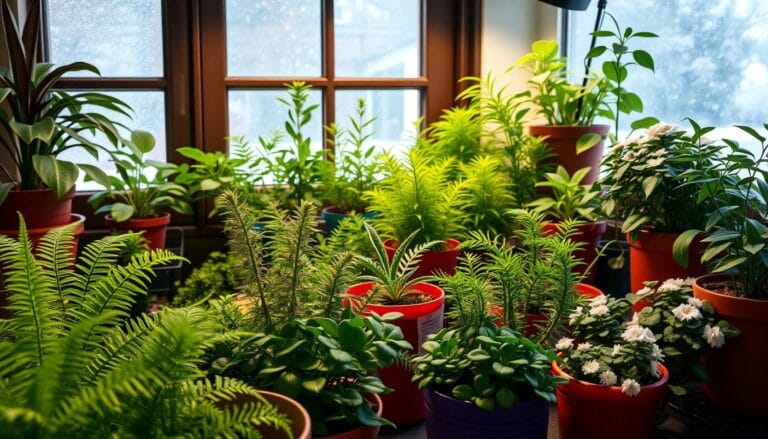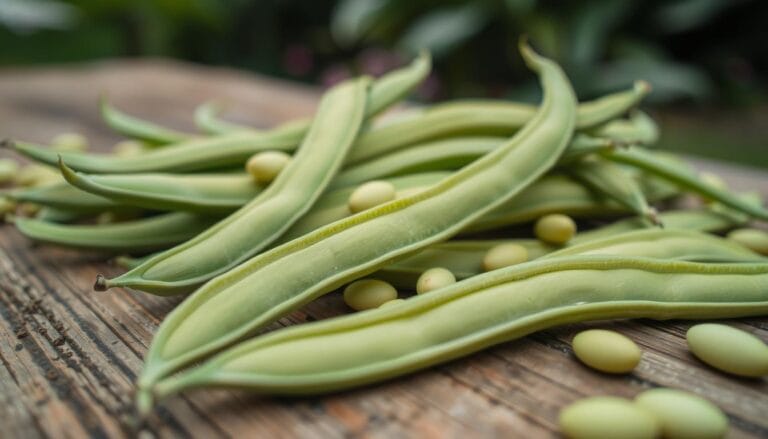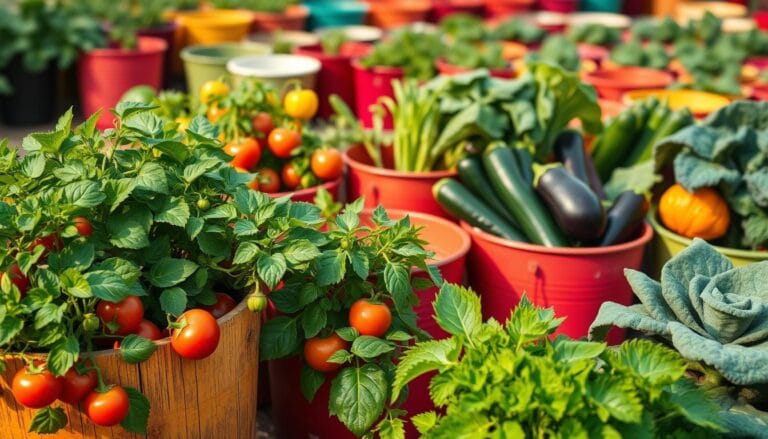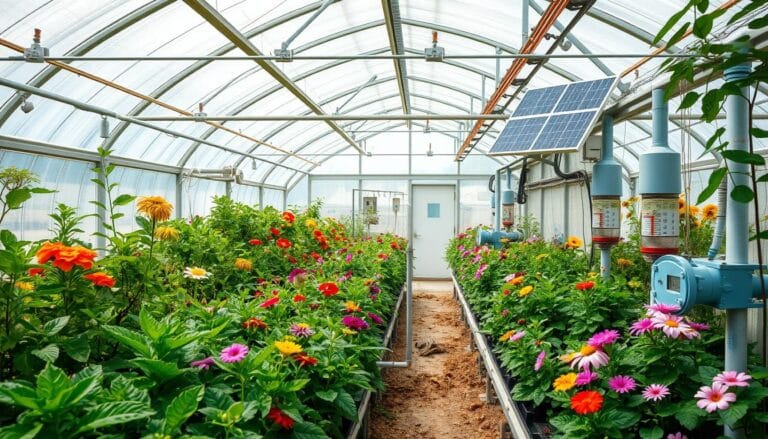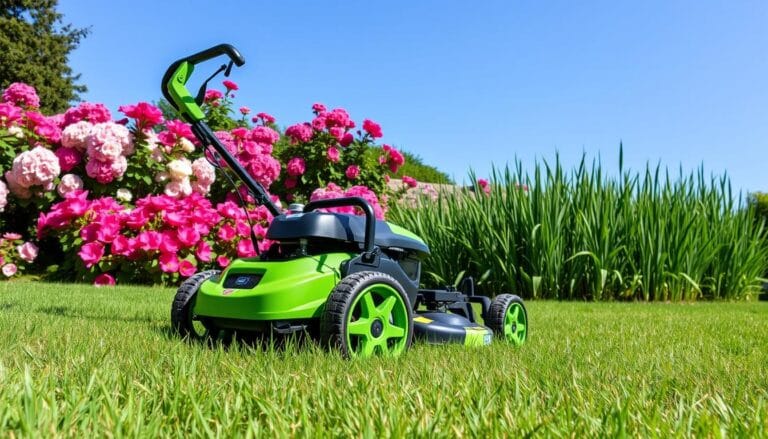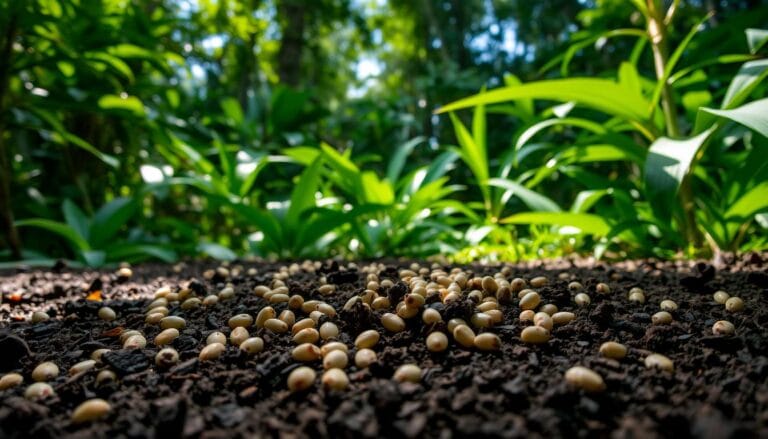Full-Sun Winter Plants Perfect for Georgia Gardens
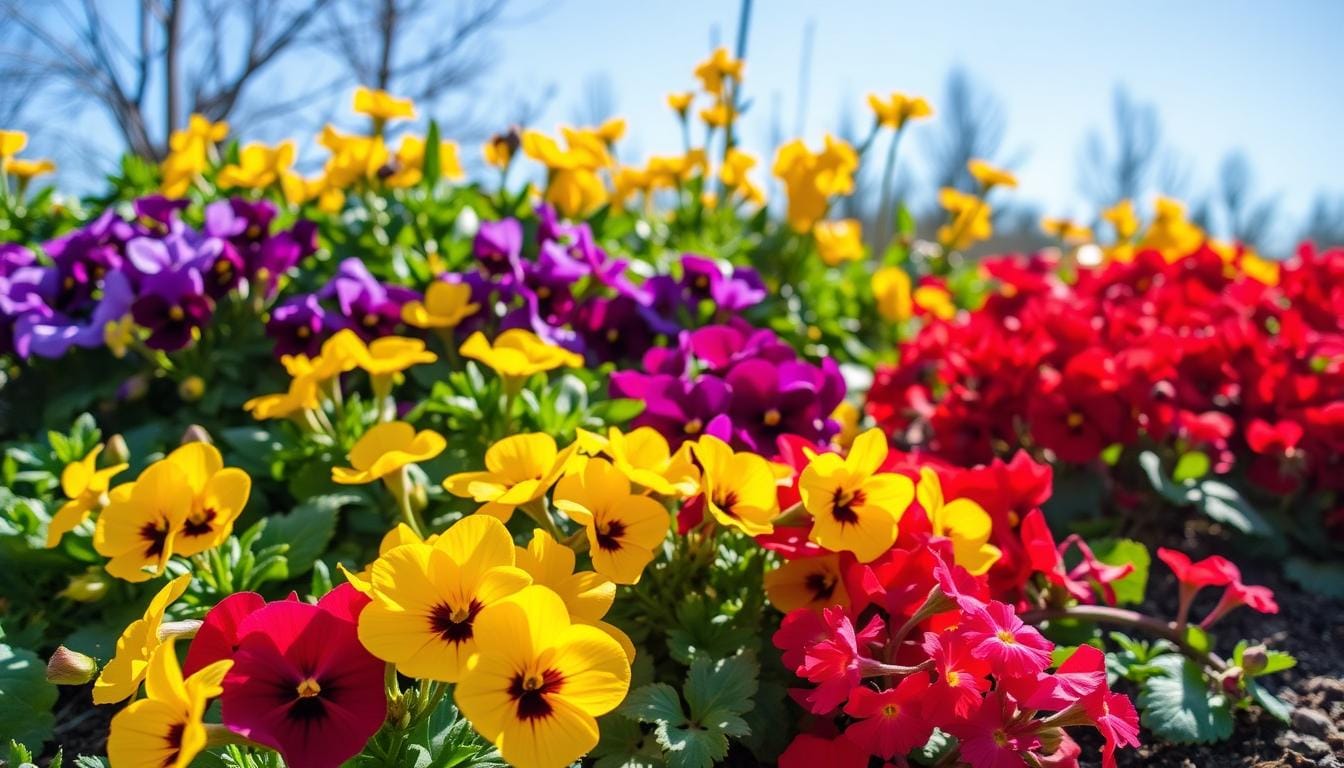
As the chilly winds sweep across the South, Georgia gardeners know that the secret to a vibrant winter landscape lies in selecting the right plants. These resilient, sun-loving species thrive in the state’s diverse climate. They offer a burst of color and life even during the coldest months.
Whether you’re a seasoned green thumb or a budding gardener, this guide will introduce you to the perfect full-sun winter plants. They will transform your Georgia gardehttps://www.greenornamental.com/what-potted-plants-do-well-in-zone-7-winter/n into a year-round oasis.
Table of Contents
Understanding Georgia’s Winter Growing Conditions
Georgia’s diverse climates make winter gardening a challenge. The state spans from USDA Hardiness Zone 6a in the north to 9a near the coast. Gardeners get 9-10 hours of sunlight daily, perfect for plants that love the sun.
USDA Hardiness Zones in Georgia
Georgia’s USDA zones range from 6a to 9a. The Appalachian Plateau is mostly zones 6a to 7a. The Blue Ridge area is zone 7a.
Central Georgia is in zones 7b to 8a. South Georgia, near the coast, is zones 8a to 9a.
Winter Sunlight Patterns in Georgia
Georgia gets 9-10 hours of sunlight in winter. This is great for winter gardening georgia, cold hardy plants georgia, and sunny plants georgia cool season. The consistent light helps gardeners grow many types of plants in winter.
Soil Requirements for Winter Growth
For winter growth in Georgia, you need well-draining, fertile soil. The pH should be between 6.0 and 7.0. Adding organic matter and nutrients is key to helping plants grow well in the cold.
Knowing Georgia’s growing conditions helps gardeners choose the right winter gardening georgia, cold hardy plants georgia, and sunny plants georgia cool season. This knowledge is crucial for a successful winter garden.
Essential Tips for Winter Garden Preparation
As winter comes, it’s time to get your Georgia garden ready. You can make sure your plants do well by following some key steps. Here are the top tips to prepare your garden for winter:
- Organize Your Supplies: Collect all gardening tools and materials you’ll need for winter. Make sure you have cold-hardy plants, mulch, and frost blankets.
- Plan Your Layout: Think about where to plant winter-interest species like Tiarella and Azaleas. Place cold-hardy plants like pansies and ornamental kale for color.
- Divide Perennials: Late fall is the best time to divide and transplant perennials. It helps them grow better and survive winter.
- Ensure Proper Drainage: Check that containers and raised beds drain well. This prevents waterlogging and root rot in wet winter months.
- Use Organic Fertilizers: Use organic fertilizers to keep your winter garden healthy. It also supports the local ecosystem.
- Implement Responsible Pest Control: Start with manual removal and water spraying. Use chemical pesticides only when necessary. This keeps your garden balanced.
By following these tips, you can make your Georgia winter garden a success. Enjoy the beauty of cold-hardy plants and winter-blooming shrubs all season.
| Hardy Vegetables | Temperature Range |
|---|---|
| Tolerate Hard Frosts | 25° to 28°F |
| Semi-Hardy Vegetables | 29° to 32°F |
Remember, good planning and care are crucial for a thriving winter garden in Georgia. Organize, plan, and care for your plants. This way, you can create a beautiful winter oasis that will amaze you all season.
winter plants to grow in georgia that require sunlight
Creating a vibrant winter garden in Georgia means choosing plants that love full sun. There are many cold-hardy flowers and winter vegetables that add color and life to your garden, even when it’s cold.
Cold-Hardy Flowering Plants
Pansies, violas, and snapdragons are great for Georgia’s winter gardens. They can handle cold temperatures and keep blooming, adding color to your garden. Plant them in well-draining soil and make sure they get 4-6 hours of direct sunlight a day.
Winter Vegetables for Sunny Spots
Kale, collards, and Brussels sprouts are excellent choices for winter vegetables in sunny Georgia gardens. They’re not only good for you but also add beauty to your garden. Make sure the soil is right and water them regularly for a good harvest.
Native Winter Plants
Adding native winter plants to your garden supports local ecosystems and adds beauty. The Woodland Sunflower and Tiarella are great choices that need full sun and can handle winter. They do well with regular watering and a balanced fertilizer every 2-3 weeks.
By picking winter plants that love Georgia’s sunlight, you can have a vibrant garden all winter. With the right care, these plants will add warmth and beauty to your outdoor space.
Best Flowering Plants for Winter Color
When it gets colder and the days get shorter, finding plants for your Georgia garden can be fun. There are many flowering plants that do well in winter sun. They add much-needed color to your landscape.
Camellias are a favorite in Georgia for winter blooms. These evergreen shrubs have vibrant flowers in pink, red, and white. They start blooming in November and keep going until March. Pansies and violas also add color, with shades from deep purple to bright yellow. They love the cool weather and bloom well into spring.
For a splash of yellow, try winter jasmine or daffodils. Winter jasmine blooms in February, and daffodils bloom late winter. Hellebores, or Lenten roses, offer evergreen leaves and delicate flowers in many colors.
When picking plants for your Georgia garden, choose ones that like full sun to partial shade. They should also like well-draining soil. With the right care, these georgia winter flower plants and sun loving plants georgia winter will brighten up your winter vegetable gardening georgia.
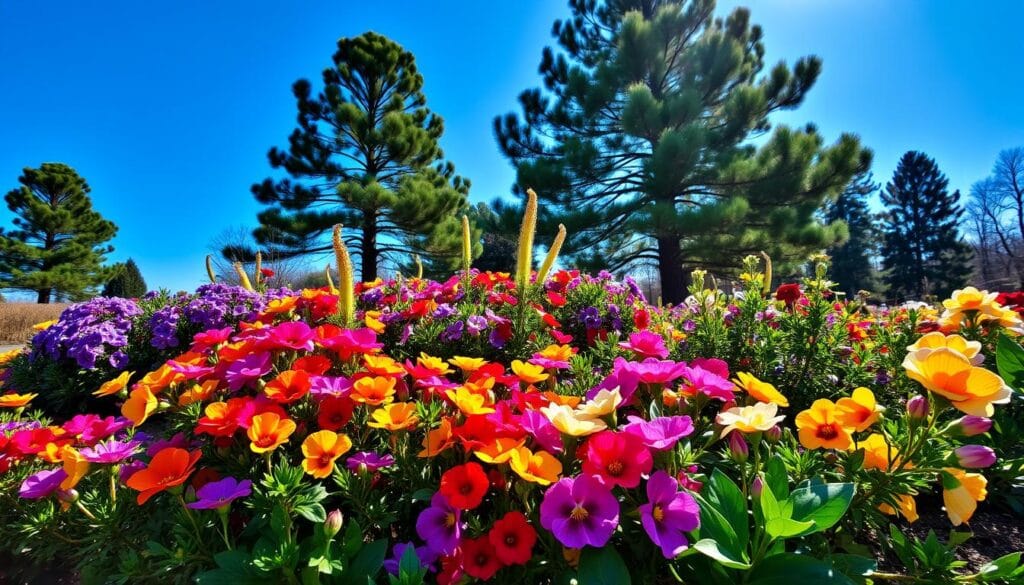
“The true secret of happiness lies in taking a genuine interest in all the details of daily life.” – William Morris
Winter-Blooming Shrubs and Trees
As winter comes, Georgia gardeners look forward to the beauty of winter-blooming shrubs and trees. These plants add color and interest to gardens. From camellias to witch hazels, they thrive in Georgia’s sunny conditions.
Camellias and Their Care
Camellias are a favorite in Georgia gardens, blooming from late fall to mid-spring. They love partial shade and well-draining soil. Their glossy leaves and vibrant flowers in pink, red, and white are stunning.
With the right care, camellias can grow 6 to 15 feet tall. They are a great choice for any winter garden.
Witch Hazel Varieties
Witch hazels are another winter delight, with spidery blooms in yellow, orange, or red. These shrubs do well in full sun to partial shade. They can grow 15 to 20 feet tall.
The unique flowers of witch hazel add color to the landscape when it’s otherwise quiet.
Winter Heath Options
Winter heath is a great choice for a low-growing, evergreen groundcover. It has needle-like leaves and delicate flowers in pink, purple, and white. It prefers full sun to partial shade and can spread up to 2 feet wide.
These winter-blooming shrubs and trees make any georgia winter flower plants and cold hardy plants georgia garden more beautiful. They provide interest and structure all year. By choosing a mix of these winter gardening georgia favorites, your garden will be vibrant and captivating, even in the cooler months.
“Camellias are the jewels of the winter garden, their waxy blooms shining like gems against the dark evergreen foliage.”
Georgia Native Winter Pollinators
As winter hits Georgia, native pollinators are still buzzing around. They are key to our ecosystem. Bees, butterflies, and hummingbirds are all important for gardeners and nature lovers.
The Georgia Pollinator Plants of the Year program started in 2020. It highlights the hard work of these pollinators. Each year, a group picks four plants that are beautiful and help pollinators.
In 2024, the chosen winter plant is the Hamamelis virginiana, or Witch Hazel. This shrub has bright yellow flowers that light up the winter. It attracts many pollinators looking for food.
Other winter plants like Asclepias tuberosa (Butterfly Weed) and Lobelia cardinalis (Cardinal Flower) are also great. They love the sun and help pollinators. These plants also make vegetable gardens better by attracting pollinators.
The University of Georgia Cooperative Extension helps gardeners make spaces for pollinators. They focus on native plants to keep wildlife healthy. By using these plants, gardeners in Georgia can make beautiful, eco-friendly spaces.
| Georgia Pollinator Plant of the Year | Common Name | Scientific Name | Bloom Season |
|---|---|---|---|
| 2024 Georgia Native | Witch Hazel | Hamamelis virginiana | Winter |
| 2024 Spring Bloomer | Lynnhaven Carpet | Erigeron pulchellus | Spring |
| 2024 Summer Bloomer | Horsemint | Monarda punctata | Summer |
| 2024 Fall Bloomer | White Wood Aster | Eurybia divaricata | Fall |
Adding these plants to your garden makes it a haven for pollinators. It also celebrates Georgia’s natural beauty. For more info and to find native plants, visit t.uga.edu/8sn.
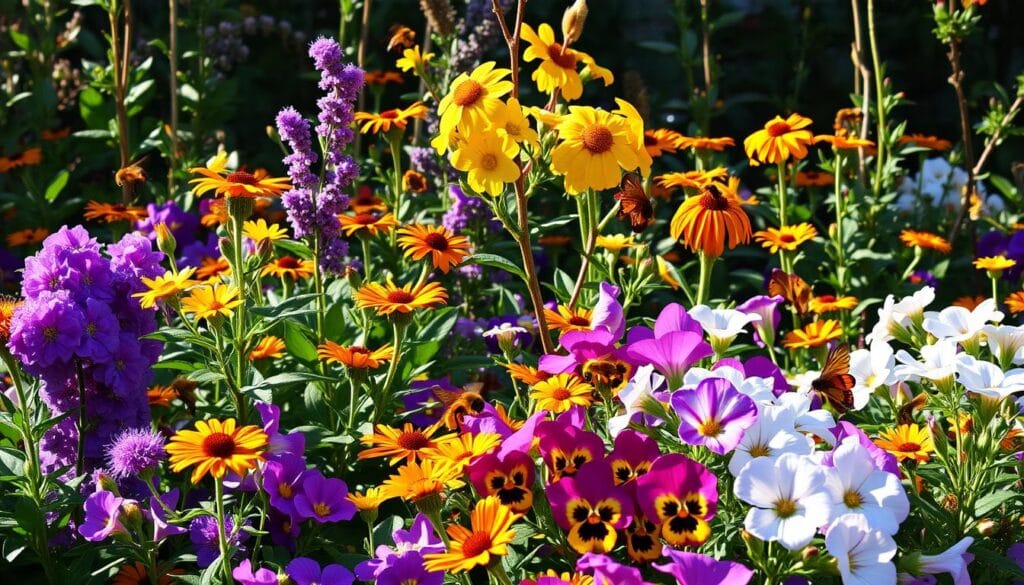
Winter Herbs for Sunny Georgia Gardens
If you garden in Georgia, you’re in for a treat. The state’s mild winters and lots of sunshine are perfect for growing herbs all year. You can add flavor to your winter meals or enjoy the health benefits of medicinal herbs. There are many sun-loving herbs to choose from.
Culinary Herbs That Thrive in Winter
Rosemary, thyme, and sage are great for Georgia’s winter. Rosemary grows up to 5 feet tall and smells like pine all year. Thyme, with over 400 types, like lemon and caraway, adds depth to soups and stews. Sage has gray-green leaves and is good in many savory dishes.
Medicinal Winter Herbs
Georgia gardeners can also grow medicinal plants in winter. Echinacea boosts the immune system and calendula may help with inflammation. Anise hyssop attracts pollinators and adds to your garden’s beauty.
These herbs make your meals taste better and are good for you. They also make your garden look nice and attract helpful insects. By adding them to your garden, you can enjoy the sun’s benefits even when it’s cold.
| Herb | Benefits | Growing Conditions |
|---|---|---|
| Rosemary | Evergreen, aromatic, culinary | Full sun, well-drained soil |
| Thyme | Culinary, ornamental, medicinal | Full sun, well-drained soil |
| Sage | Culinary, medicinal, ornamental | Full sun, well-drained soil |
| Echinacea | Medicinal, immune-boosting | Full sun, well-drained soil |
| Calendula | Medicinal, anti-inflammatory | Full sun, well-drained soil |
| Anise Hyssop | Culinary, medicinal, pollinator-friendly | Full sun, well-drained soil |
Maintaining Winter Plants in Full Sun
As winter comes to Georgia, taking care of your sun-loving plants is vital. They need your attention to keep blooming. Whether it’s winter veggies or colorful flowers, keeping your garden alive is important.
Start by watering your winter gardening georgia plants well, especially when it’s dry. Mulching keeps the soil moist and warm. It also protects the roots from cold. For plants that are sensitive, use frost cloths or row covers to keep them safe from frost.
Prune winter-blooming shrubs like Forsythia and Witch Hazel regularly. Also, remove dead flowers to keep them blooming. For your sun loving plants georgia winter, water and fertilize them often. This helps them grow strong and colorful.
Watch out for pests and diseases too. Fix any problems quickly to keep your winter vegetable gardening georgia plants healthy. By being careful and active, you can have a beautiful winter garden.
“Gardeners can enjoy a colorful garden in the winter, making it a fun activity.”
Winter gardening is great for growing food all year. It also means fewer pests and weeds. With the right care, you can have a vibrant, sun-loving garden in Georgia, even in the cold.
Common Winter Garden Challenges and Solutions
As winter comes to Georgia, gardeners face unique challenges. Knowing these issues and how to solve them can help your garden stay healthy. This is true even when the weather changes.
One big worry is sudden freezes. These can harm plants that aren’t used to cold. To protect your plants, use frost cloths or row covers. They add an extra layer of protection for winter gardening georgia, cold hardy plants georgia, and sunny plants georgia cool season.
Winter temperatures can also change a lot. Choosing plants for USDA Hardiness Zones 7-8 is key. These cold hardy plants georgia can handle the area’s changing weather better.
| Common Winter Garden Challenges | Effective Solutions |
|---|---|
| Unexpected freezes | Use frost cloths or row covers for protection |
| Fluctuating temperatures | Select cold hardy plants georgia suited for USDA Hardiness Zones 7-8 |
| Overwatering | Ensure proper soil drainage and adjust watering schedules |
| Pest infestations | Employ manual removal and organic pest control methods |
| Lack of sunlight | Plant sunny plants georgia cool season in south-facing areas and prune overhead branches |
| Winter weeds | Regular mulching and hand-pulling to maintain a tidy garden |
Winter can also mean too much water for plants. They need less because they grow less. Make sure the soil drains well and water less often to avoid root rot.
Keeping pests away is also important. Use manual removal and organic methods to keep your winter gardening georgia garden healthy and beautiful.
For plants that love the sun, make sure they get enough light. Plant them in sunny spots and trim branches that block sunlight. This helps your sunny plants georgia cool season get the sun they need.
Keeping your garden clean is also key. Mulch and pull weeds regularly. This helps your cold hardy plants georgia and sunny plants georgia cool season look their best during winter.
“With the right preparation and management strategies, your Georgia winter garden can be a vibrant oasis, even during the cooler months.”
Conclusion
Georgia’s climate is perfect for winter gardening, especially with plants that love the sun. By choosing the right plants and understanding the local weather, gardeners can have a lively winter garden. This garden can be full of native pollinators, herbs, and colorful flowers, helping the environment.
Winter gardening in Georgia is great for both new and experienced gardeners. It adds beauty, fresh food, and helps the environment during the cold months. By planting winter plants to grow in georgia that require sunlight, following winter gardening georgia tips, and using georgia winter flower plants, you can make your outdoor space beautiful all year.
Follow the advice in this article to grow winter plants to grow in georgia that require sunlight well. Use the winter gardening georgia climate to your advantage. Enjoy the beauty and harvest of georgia winter flower plants all year. Start your winter garden today and make your backyard a green oasis.
FAQ
What are some full-sun winter plants that can thrive in Georgia?
How do Georgia’s winter growing conditions differ across the state?
What are some essential tips for preparing a Georgia winter garden?
What are some cold-hardy flowering plants and vegetables that can thrive in Georgia’s sunny winter gardens?
What are the best flowering plants for winter color in Georgia?
What are some winter-blooming shrubs and trees that can add structure and color to Georgia gardens?
How can Georgia gardeners attract winter pollinators to their gardens?
What culinary and medicinal herbs can be grown in Georgia’s sunny winter gardens?
How can gardeners maintain their sun-loving winter plants in Georgia?
What are some common winter garden challenges in Georgia, and how can they be addressed?
Source Links
- 25 Winter Flowers That Love Cold Weather – https://www.housebeautiful.com/lifestyle/gardening/g2854/plants-that-bloom-in-winter/
- 44 Flowers That Thrive In Full Sun – https://www.southernliving.com/garden/full-sun-plants?srsltid=AfmBOorSmgpWu-iNTaXLdZ0btFLVUW3WtF8zNZ9zG5O_1DXtkp-LXg-B
- These Full-Sun Perennials Will Fill Your Garden’s Sunny Spots with Ease – https://www.countryliving.com/gardening/garden-ideas/g24942296/full-sun-perennials/
- Protect landscape plants from winter temperatures – https://newswire.caes.uga.edu/story/5297/cold-plants.html
- What Planting Zone is Georgia? – https://www.lawnstarter.com/blog/georgia/planting-zone-georgia/
- Planting Calendar for Atlanta, GA – https://www.almanac.com/gardening/planting-calendar/ga/Atlanta
- 10 Tips for Preparing Your Garden for Winter – https://www.almanac.com/10-tips-preparing-your-garden-winter
- Winter-Proofing Your Garden: Top Cold-Tolerant Container Plants – Bootstrap Farmer – https://www.bootstrapfarmer.com/blogs/backyard-gardening/winter-proofing-your-garden-top-cold-tolerant-container-plants?srsltid=AfmBOorEMNiH1-UpI0q6OcQ6vFDYdwesjKa5S5ZG5XgZ9yWXzVVLmfvZ
- Your Herb Garden Needs Special Care in Winter—These Expert Tips Will Keep It Healthy for Next Year – https://www.marthastewart.com/winter-herb-garden-8737067
- 20 Flowers You Can Plant During The Winter – https://www.southernliving.com/garden/flowers/what-flowers-can-be-planted-in-winter?srsltid=AfmBOopgt_85dsszICCDtVwY2zX4MwFQPToKmUYrfoHfQCwbQ2ZiP5Hh
- Winter Plants – Garden Solutions – https://www.waysidegardens.com/garden-solutions/winter-interest-plants.html?srsltid=AfmBOooQ5IlvNpksqldbEi5OXH8Q4Fsluaj1FYLzcxougRugKXz0lw4r
- Perennials – Georgia gal gardens – https://georgiagalgardens.com/?cat=12
- These Flowers Will Thrive in the Coldest Months of the Year – https://www.thepioneerwoman.com/home-lifestyle/gardening/g37406360/winter-flowers/
- 20 Flowers You Can Plant During The Winter – https://www.southernliving.com/garden/flowers/what-flowers-can-be-planted-in-winter?srsltid=AfmBOorAKFeeHKIc98v1U4zM7QOER6Xtt0_bX2u9A34_PY3uxYr8IryE
- 20 Best Flowering Shrubs To Grow In Full Sun – https://www.southernliving.com/garden/shrubs/flowering-shrubs?srsltid=AfmBOooXqdaLAph0rQqTJd2Rc0kqwfYooFlMw4_GEROrMV3whjEcwgm8
- Winter Beauty in Bonnie’s Garden – Fine Gardening – https://www.finegardening.com/article/winter-beauty-in-bonnies-garden?srsltid=AfmBOopDwghhzb5sniK7BMbg78htFRWttkNm1ELamMq1toqVB3d3fEJv
- 14 Best Trees to Plant in Atlanta, GA – https://www.lawnstarter.com/blog/georgia/atlanta-ga/best-trees-atlanta/
- State Botanical Garden at UGA debuts 2024 Pollinator Plants of the Year – https://botgarden.uga.edu/2024-pollinator-plants/
- Five Plants Georgia Pollinators Love — Keep Georgia Beautiful Foundation – https://www.kgbf.org/blog/five-plants-georgia-pollinators-love
- 2023 in Pictures – http://usinggeorgianativeplants.blogspot.com/2023/
- Growing herbs can be grown in the summer and dried for use in the winter – https://newswire.caes.uga.edu/story/5402/herb-garden.html
- Hardy Winter Herbs: Cold-Hardy Herbs For Outdoors – https://www.gardeningknowhow.com/edible/herbs/hgen/herbs-that-survive-winter.htm
- 20 Flowers You Can Plant During The Winter – https://www.southernliving.com/garden/flowers/what-flowers-can-be-planted-in-winter?srsltid=AfmBOoreo-9fw1hoUwbV1Hv8aCD0-vqHdPaG7-REFhYr8GQqYstIvNbS
- Growing Winter Garden Plants: A Complete Guide – https://kissanshop.com/winter-garden-plants/
- Winter-Proofing Your Garden: Top Cold-Tolerant Container Plants – Bootstrap Farmer – https://www.bootstrapfarmer.com/blogs/backyard-gardening/winter-proofing-your-garden-top-cold-tolerant-container-plants?srsltid=AfmBOorwSijbMUaxQR3IvZH980gB416eafeRadWjaIXBnQ9DWcU_X-3W
- Strategic Winter Garden Preparation Techniques – https://gloverlandscapes.com/winter-garden-preparation-techniques/
- Fall Planting Flowers – A comprehensive guide to planting in the fall – https://outdoormakeover.net/best-flower-options-for-fall-planting/
- 9 Best Flowers to Plant in Georgia – https://agribotix.com/flowers-to-plant-in-georgia/
- Top 5 Beginner-Friendly Winter Cover Crops – https://www.bootstrapfarmer.com/blogs/backyard-gardening/beginner-friendly-winter-cover-crops?srsltid=AfmBOoqgj14w4dJfx7mICoXbzC1lQ27leeji8soKyzS-L_vJpA_yDDud
There are no reviews yet. Be the first one to write one.

